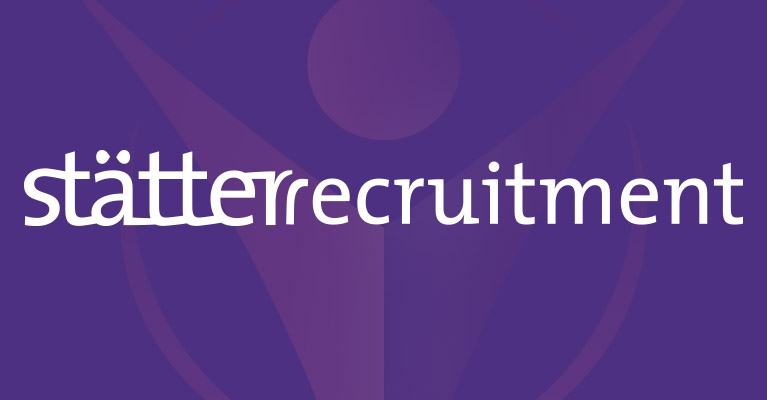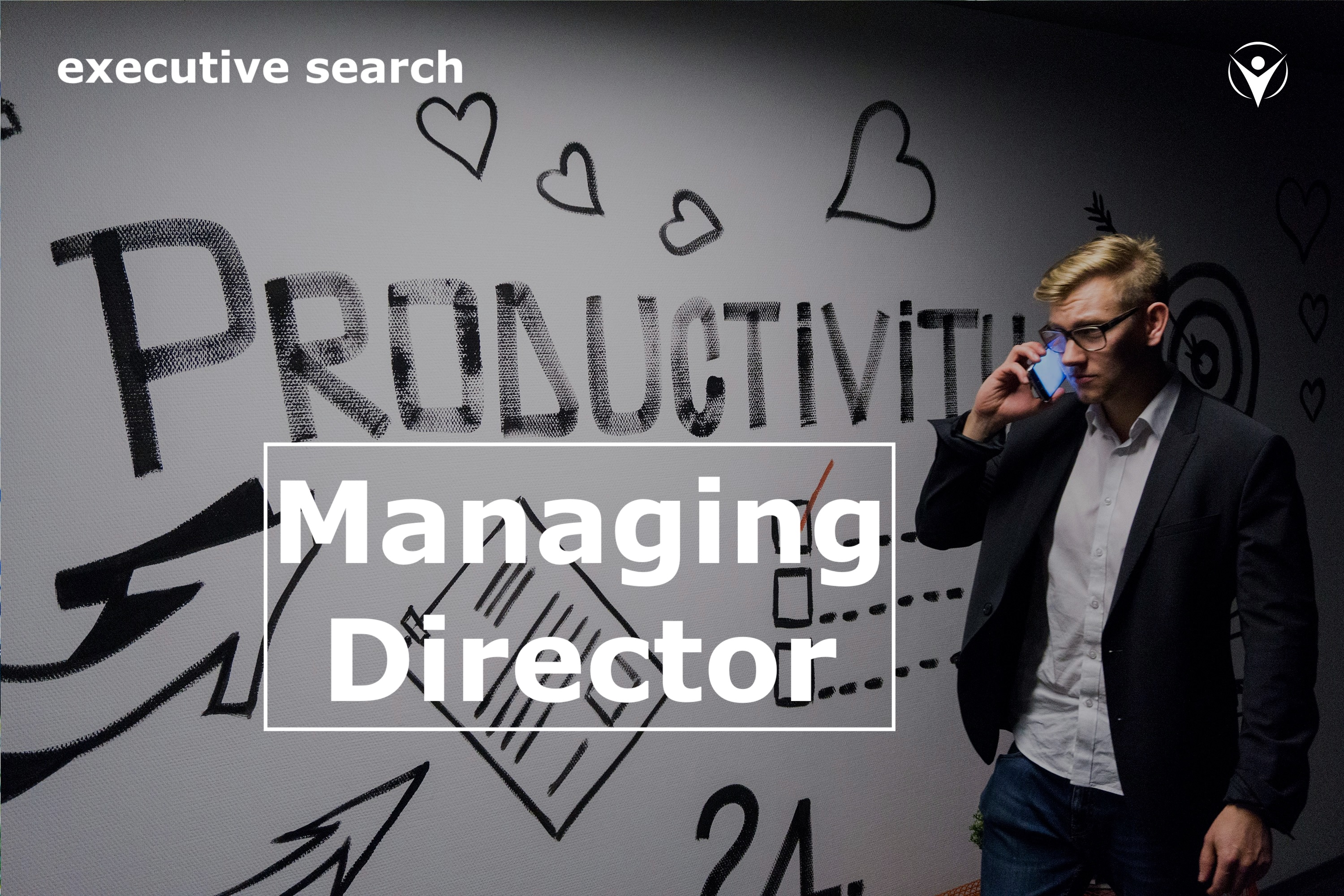Job interview. A necessary evil. Most candidates break out in a cold sweat at the mere thought. How do I prepare? What are they going to ask me? What should I ask them? Those are just a few of the questions that run through the mind of the average interviewee.
Whilst we can’t prepare you for every eventuality, we can give you the low-down that’ll help tip the balance in your favor. We surveyed more than 500 professionals involved in the hiring process to determine which job interview questions they ask most often.
We also asked them about what they expect candidates to ask them. And because we wanted to look at the lighter side of interviews, we asked about their most weird and wonderful questions and experiences too.
But we didn’t stop there. To get some perspective from both sides of the interview desk, we asked the same questions of 1000+ American workers about their experiences as job candidates. To put it in “corporate speak” you could say we did a 360 degree review of the interview experience.
So read on, and see what you can expect from your next turn in the hot seat.
Tell Me About Yourself: Interviewer Favorites
As popular wisdom has it, if you fail to prepare you prepare to fail. But choosing what to prepare for a job interview can be tough. There are a million and one guides on how to answer interview questions but not so much on which questions are most likely to be asked.
Knowing which questions recruiters favor gives you a big head start in your interview prep. So we gave our respondents a list of popular interview questions and asked if they typically used them. Here’s what they told us.
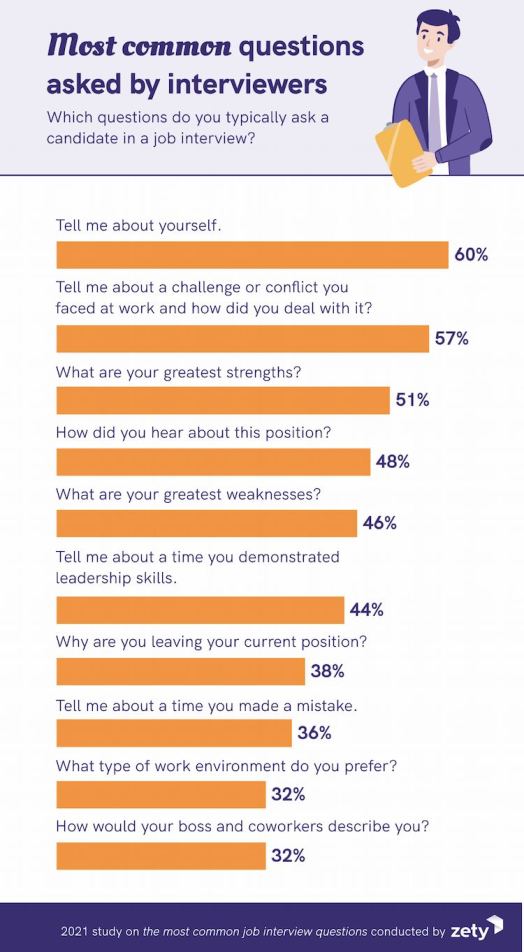
OK, so we gave you a pretty big hint in the title for this section. The most commonly used interview question is indeed “Tell me about yourself.” This is followed closely behind by “Tell me about a challenge or conflict you faced at work and how did you deal with it?”
This was mirrored very closely by what job candidates told us. If anything, they reported an even stronger confirmation of the most commonly asked questions. Just take a look at the percentage of candidates who reported being asked the top five questions on our list.
- Tell me about yourself—94%
- Tell me about a challenge or conflict you faced at work and how did you deal with it?—82%
- What are your greatest strengths?—91%
- How did you hear about this position?—84%
- What are your greatest weaknesses?—80%
The remaining questions on the list were also encountered by a significant majority of job candidates.
So what do the most popular questions have in common? What can they tell us about hiring managers’ interviewing strategy? What’s immediately apparent is that four out of the top ten questions start off with “tell me about.” That helps to illustrate an important point about the tactics recruiters use to find out about you. A “tell me about” request is a classic example of an open-ended question.
And it turns out the majority of questions on that list are open-ended. Let me explain what that means. A closed-ended question restricts you to yes/no or a small set of possible answers. It limits your response. For example, are you comfortable working remotely?
An open-ended question on the other hand actually prompts you to answer in more detail, using stories, examples and lists. Answers to these questions give deeper insights. For example, what would your perfect job look like?
That’s your cue on how to answer these questions when they come your way. Give detail, and give examples. Even if the question is more closed, elaborate and explain. For example don’t just say you like a particular type of work environment, explain why and explain how it makes you more productive and a better contributor to your potential employer.
The “tell me about” questions are also classic examples of situational interview questions. The interviewer wants to know about how you handled yourself in a past situation and uses that answer to gauge your experience and skills.
Interestingly, these questions have been proven by multiple studies to provide a highly accurate way of measuring a candidate’s abilities. Asking a candidate what they have done versus what they would do is a highly effective interviewing technique. And thankfully, there’s also a highly effective approach to answering these questions too.
Our advice is to use the problem-solution-benefit approach. Structure your answers like so:
- Explain the problem you faced
- Tell the interviewer your solution
- Show how your solution benefited your employer
As for the others, there are all kinds of ways of answering them effectively. The STAR method is particularly effective (Situation, Task, Action, and Result).
But an interview isn’t just one-way traffic. You need to ask some questions yourself, and next you’ll find out which ones are best.
Do You Have Any Questions For Me?
To be honest, the question you just read belongs in the previous list too. You will be asked this at the end of most job interviews. No matter how much detail you went into when answering the interviewer you’ll still have to ask some questions yourself. If you don’t, it makes you look like you’re not interested or fully committed.
Deciding what to ask can be quite the conundrum though. So we asked our respondents what they expect to be asked. Here are their top ten choices from a list of popular candidate questions.
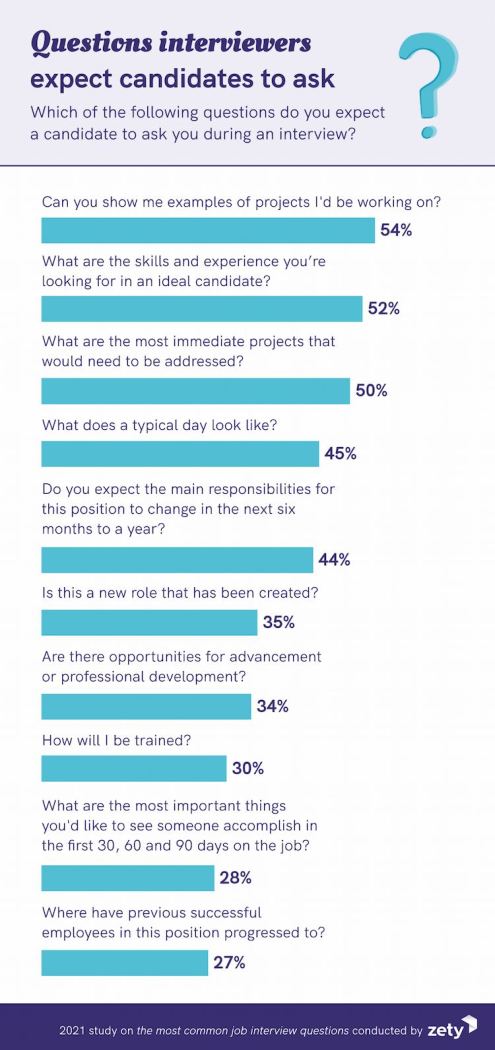
Once again, they’re almost all open-ended questions. A yes/no response from the interviewer isn’t going to give you much insight. So make sure you give them the opportunity to go into lots of detail.
And all ten of them have one golden thread running through them. Showing a genuine interest in the role and the organization you’re applying for. There’s also a strong focus on future advancement, training and progression. Interviewers want candidates who are committed and who intend to grow and develop, contributing to their employer’s future success.
So how aware were the candidates themselves about the sort of questions they should ask? Here are the numbers, again sticking to the top five.
- Can you show me examples of projects I’d be working on?—55%
- What are the skills and experience you’re looking for in an ideal candidate?—69%
- What are the most immediate projects that would need to be addressed?—49%
- What does a typical day look like?—67%
- Do you expect the main responsibilities for this position to change in the next six months to a year?—39%
As you can see, candidate awareness isn’t bad, but it isn’t great either. And a majority of candidates don’t ask two out of the top five questions most favored by recruiters.
If you don’t want to make the same mistake, we’d advise to note our list of recruiters’ favorites and make sure you ask some of them when it comes to the end of the interview. You don’t have to copy them word for word though. As we’ve already stated, the key is to keep your questions open, show an interest and focus on progression. It’ll help to make sure you leave the right impression with your prospective employer.
But interviews don’t always go according to plan, and interviewers and candidates alike will occasionally throw a curveball or two.
Say What? Unusual Interview Questions
You’ve probably heard about some examples of these already. Sometimes, despite the best preparation, the interviewer catches you off guard with something genuinely left field. So we asked our respondents about the most unique questions they ask potential candidates.
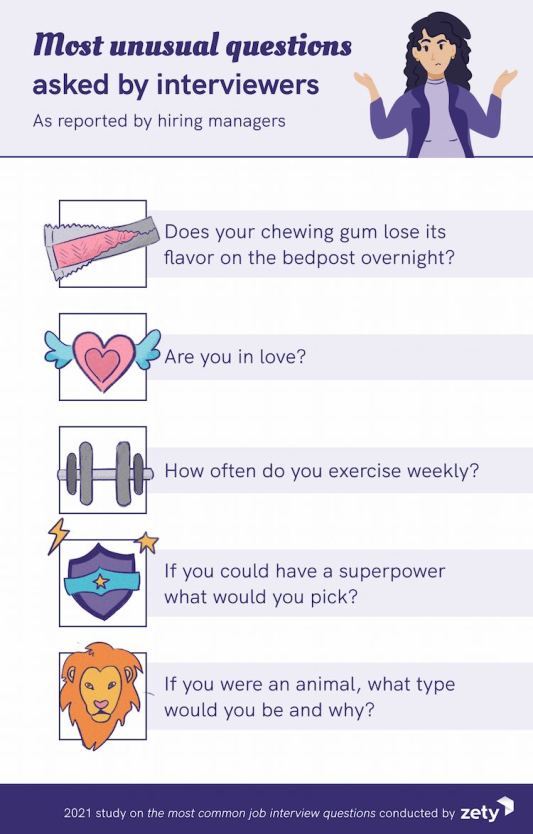
I admit, when I went through the response data I suspected that a couple of these responses were an attempt to troll us. That one about chewing gum, it turns out it’s also the title of a novelty song from the 1950s that was later covered by The Muppets.
Asking if someone is in love is weird too. That said, some interviewers deliberately ask oddball questions to throw the interviewee off balance and see how they respond to the unexpected. Let’s face it, nobody is going to do any preparation beforehand for those questions. As frivolous as they may seem they can serve a purpose.
Asking about someone’s exercise habits seems a little more straightforward, it could be an attempt to build rapport with similar interests or simply seeing if you fit in with a physically active company culture.
As for the other two, they give the interviewer insights into your ability to craft creative responses on the spot. In the classic, “what animal would you be?,” you can be thoughtful in your answer and discuss your strengths.
For example, you could say you’d be a honey bee because they work together in a group to achieve success for the hive. That proves you’re a team player, incidentally, one of the top traits employers look for. Feel free to steal that answer for yourself.
And proving your employability skills also factors heavily into the superpower question, as one of our respondents explained:
I’ve asked candidates if they were a superhero, who would they be and why? What advantages would that superhero’s powers give them? I’m looking for a creative response and whether they would use those powers to benefit only themselves or their co-workers and our organization more generally. It’s used to assess their team player mentality.
Whatever you do, don’t use that question as an opportunity to discuss the merits of Iron Man vs Thor. No matter how weird the query seems, take a deep breath, think on your feet and use it as an opportunity to sell yourself as a desirable candidate.
Speaking of candidates, does their experience with being asked unusual questions measure up to what the interviewers said? It was actually a pretty good match, with candidates reporting being asked much the same sort of questions as reported by the interviewers. They also gave us a few other genuinely weird one-off examples. Here’s a small selection of the “best.”
- If you were a coin in a blender how would you get out?
- If you were a god what would you do?
- What is the best way to tell whether a fridge light really shuts off when you close it?
- You’ve been given an elephant. You can’t give it away or sell it. What would you do with the elephant?
- Can you explain Carbon-14 dating to me? (I was interviewing for a receptionist job in a construction company)
Which brings us nicely to this interesting tidbit. Unusual interview questions could tell you something interesting about the person asking them. One study revealed links between narcissism and sadism and the likelihood of asking such brainteasers. You read that right, strange interview questions might just tell you the interviewer has some disturbing personality traits.
That said, thinking outside the box in terms of interview questions can be a useful tool. It’s not always about satisfying the hiring manager’s twisted whims. But it has to be done right. Here’s an excellent example we were given by Tim Soulo, CMO at Ahrefs, an industry-leading digital marketing and SEO suite. As you can see, Tim clearly has the best of intentions with his choice of unusual question.
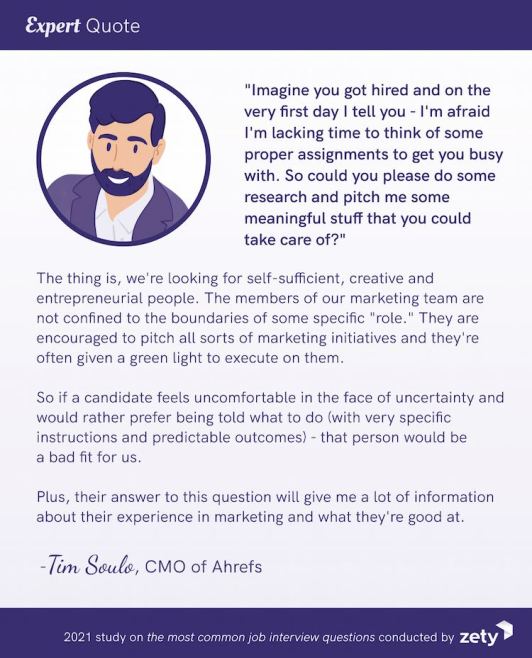
That’s incisive and smart. It uses a situational approach to obtain genuinely useful insights. But regardless of whether this approach is well-intentioned or the product of a dark and disturbed mind, it seems some interviewees want to take revenge by asking unexpected questions of their own.
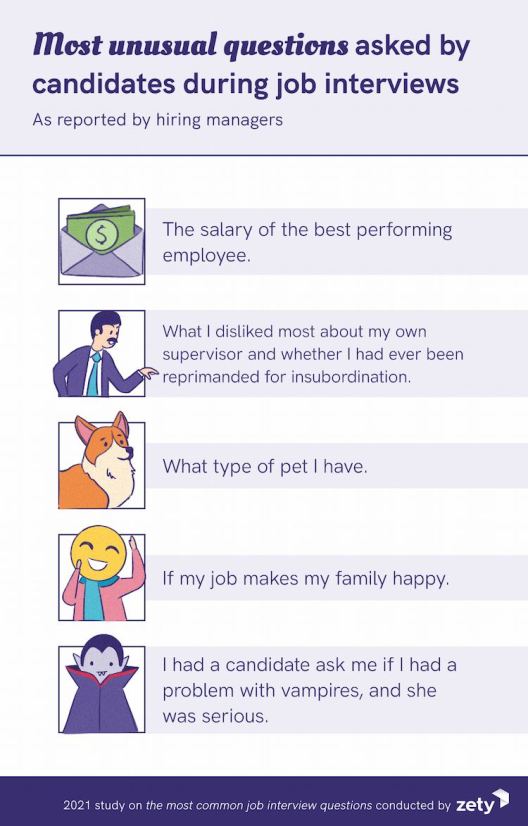
The cringe factor is high with these examples. Asking about other people’s salary, asking the interviewer to bad mouth their boss, personal questions about the interviewer’s family. These are all completely unacceptable.
As for vampires, well the right answer is only the sparkly ones, other forms of the undead are a-ok. But seriously, stick to solid questions like the examples we showed you in the previous section.
Whatever your experience as a candidate though, spare a thought for your interviewer, they may just have been subjected to the type of unpleasantness you’re about to see.
Nightmare on Recruitment Street: Worst Interview Experiences
Lastly, we asked our intrepid respondents about the worst interview experiences they’ve had. Here’s a few doozies for you.
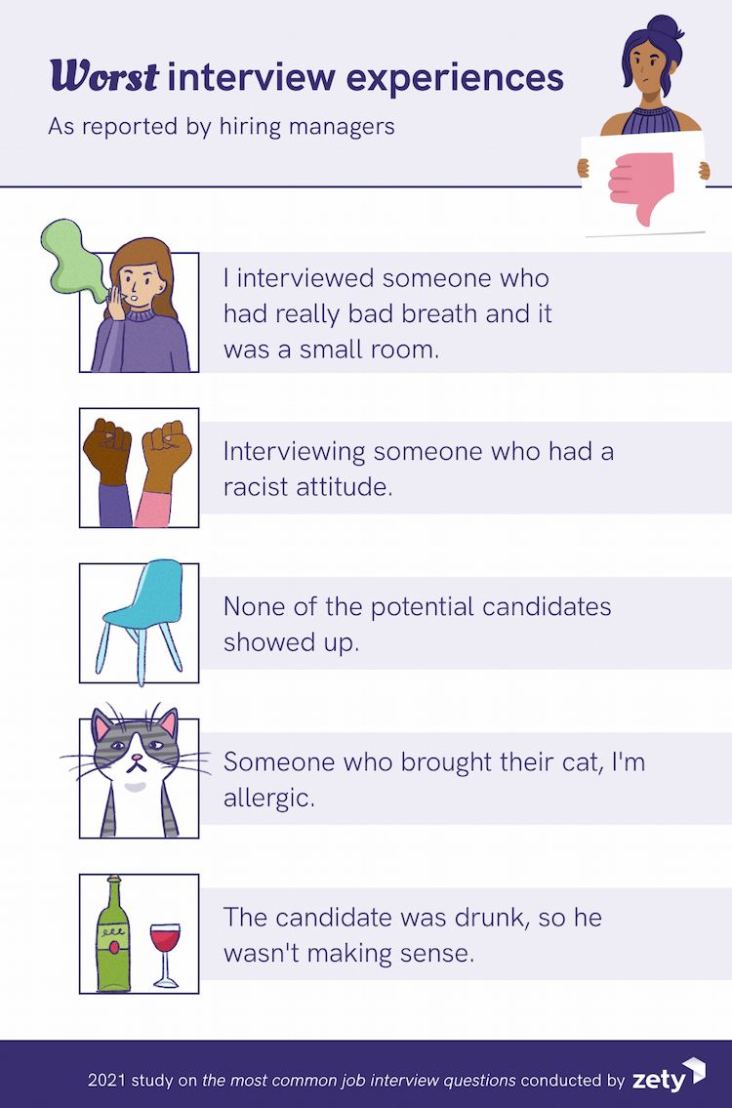
Some of this is pretty obvious, drinking, poor hygiene, racism and being a no-show are obviously out of the question if you want to make a good impression. And as for the cat? Well, I like cats, but not everyone does so leave Mr. Snookums at home, even if he does help to prove you’re the purr-fect candidate.
And it’s not just interviewers who are on the receiving end. Here are a couple of shockers that candidates reported to us.
The interviewer was just interviewing me because she had to. She planned to hire a relative for the position and told me so in the interview. In fact, she told me all about her and the relative’s close relationship and so forth. We didn’t discuss me or the job at all.
Then from blatant nepotism we move on to this toe-curling example that proves you’re not even safe in a remote interview.
In a Skype interview my dog ended up throwing up and having diarrhea from an epilepsy episode.
Conclusion
Preparing for an interview is a daunting task, even for seasoned professionals. But preparation is key. Having ready answers to some of the most common questions will give you a much-needed confidence boost that’ll help to improve your performance.
Don’t forget to ask questions too. We gave you some good examples, but as long as you keep them open-ended and ensure they demonstrate a genuine interest in the role and future growth, you’ll be set.
And don’t feel intimidated by unusual questions, think on your feet and use them as an opportunity to sell yourself. Finally, keep your own questions polite and on-point and whatever you do, remember that pets and recruitment don’t mix!
Methodology
These findings were obtained by surveying 503 U.S. professionals who are involved in the hiring process. Respondents were asked questions relating to how they conduct job interviews. These included yes/no questions, scale-based questions relating to levels of agreement with a statement, questions that permitted the selection of multiple options from a list of potential answers, and questions that permitted open responses.
We also interviewed 1,025 American workers to give their perspective on job interview experiences. They were also asked yes/no questions, scale-based questions relating to levels of agreement with a statement, questions that permitted the selection of multiple options from a list of potential answers, and questions that permitted open responses.
Source: Top Interview Questions 2021: From Most Common to Most Unusual by Jacques Buffet – Career Expert
